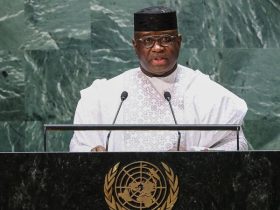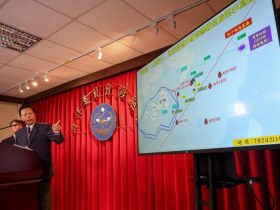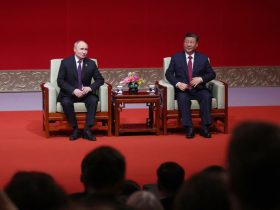China accused the United States military of “abusing international law” and continuing a pattern of “dangerous provocations” in East Asia Thursday, after a US Navy destroyer made the service’s first transit of the Taiwan Strait of 2024.
The movement on Wednesday of the USS John Finn through the waterway that separates democratically governed Taiwan from communist mainland China was also the first transit of a US warship through the strait since elections on the island two weeks ago.
The vote gave Taiwan’s ruling Democratic Progressive Party a historic third consecutive presidential victory, with the island’s voters shrugging off warnings from Beijing that its reelection would increase the risk of conflict.
China’s ruling Communist Party views Taiwan as part of its territory, despite having never controlled it, and leader Xi Jinping has not ruled out the use of military force to “reunify” the island with the mainland.
The US meanwhile is obligated under the Taiwan Relations Act to provide Taiwan with the military means to defend itself, something Beijing regards as interference in its internal affairs.
US Navy 7th Fleet spokesperson Cmdr. Meagan Greene said in a statement Wednesday that the transit of the USS John Finn through the strait was made “in accordance with international law.”
“The ship transited through a corridor in the Strait that is beyond the territorial sea of any coastal State. John Finn’s transit through the Taiwan Strait demonstrates the United States’ commitment to upholding freedom of navigation for all nations as a principle,” Greene said.
While the John Finn’s transit of the Taiwan Strait was the first of 2024, US warships and warplanes regularly travel through and over the waterway. In 2023, US Navy and Coast Guard ships and Navy reconnaissance planes made 11 transits of the strait, according to a database kept by Collin Koh, research fellow at the S. Rajaratnam School of International Studies in Singapore.
On Thursday, China’s Defense Ministry said Washington was courting danger with its military activities in the region, saying a change in behavior is “needed to avoid maritime and air accidents,” according to the state-run Xinhua news agency’s English-language website.
“The root cause of the China-U.S. maritime and air security issues lies in the U.S. military’s harassment and provocations on China’s doorstep, engaging in prolonged, extensive and high-frequency activities in the maritime and aerial areas surrounding China,” the Xinhua story said, citing Defense Ministry spokesperson Wu Qian.
“He urged the U.S. side to stop abusing international law, cease all dangerous provocations, and strictly discipline its troops on the ground,” the story said.
Earlier this month, the commander of the US Indo-Pacific Command, Adm. John Aquilino, accused Beijing of ramping up tensions.
Aquilino told a defense forum in Hawaii that he expected a show of force from China against Taiwan in the wake of the election result.
“When something occurs that they don’t like, they tend to take actions,” Aquilino told the Pacific Forum’s Operationalizing Integration in the Indo-Pacific conference in Honolulu.
Koh, the Singaporean analyst, said Beijing may be a bit “miffed” at Washington at the moment, especially after agreeing to restart military-to-military talks in December.
“Given that Beijing very likely believes that it extended the olive branch by agreeing to reopen military-to-military communications and other high-level exchanges, it might have perceived a lack of reciprocity from the US,” Koh said.






